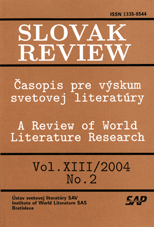KOLLÁROVE BÁSNE V SVETLE PETRARCOVHO SPEVNÍKA
Kollár's Poems in the light of Petrarch's Canzoniere
Author(s): Pavol KoprdaSubject(s): Literary Texts
Published by: Ústav svetovej literatúry, Slovenská akadémia vied
Keywords: Ján Kollár; Francesco Petrarca; Canzoniere; Augustine of Hippo; Dante Alighieri; Reception of Happiness.
Summary/Abstract: This study compares the collection of Jan Kollár Poems (1821) and Petrarch's Canzoniere. First it deals with the development of notion "modern literature". Augustine of Hippo described the origination of the notion of "free will" as the possibility for a human being to change from the stationary good to a self-creative good - that means being responsible for self-creating himself as the good - in the way that a human employs his tools and categories to his inner and outer world meanwhile he recognizes the validity of his categories as changeable. Here arises the human responsibility for self-creation which came into being mainly in the work of Petrarch as the basics of modern poetry. The premises of the study are that both Petrarch and Kollár were inspired by the teachings of Augustine of Hippo, in whose view a Christian understands happiness as an inner disposition that he employs when dealing with everyday life. His focus is on happiness even though he is in miserable position. The structure of Petrarch's Canzoniere emphasises the meaning of Augustine's conception that is to teach people to be happy even in abasement and adversities. Thus all of his poems result as complicated answers to an appeal to a poet - and humans in general - to deal with degradation and depression, to elevate themselves over the disasastrous events by accepting them as historical facts. Kollár handled the problem of "being happy in adversities" as a cultural extension of Petrarch's Canzoniere, that is, if a human being is able to experience happiness even in an extreme need, than there is no limitation for the poet to approach the issue as a moral and social imperative. Many Kollár' s rhymes express this view as an appeal for a particular community, over all the Slovaks, to maintain their social energy. In his work Slavy Dcera he applies this poetics to all the Slavic nations. The analysis of the first seven Kollár's poems and the closing shows that Kollár directly reproduces the structure of categories in Petrarch's Canzoniere, although it differs in point of view. He does not lay importance on the function of poetry as a consolation in adversities, but he reflects the Augustine's thought that the feeling of happiness prevails in a Christian in every moment. In the prospect of this conception, he opens the possibility to represent the disposition to happiness as a moral and social strength of both an individual and society, and as a style of organization of social communication.
Journal: Slovak Review of World Literature Research
- Issue Year: 2004
- Issue No: 02
- Page Range: 114-131
- Page Count: 18
- Language: Slovak

